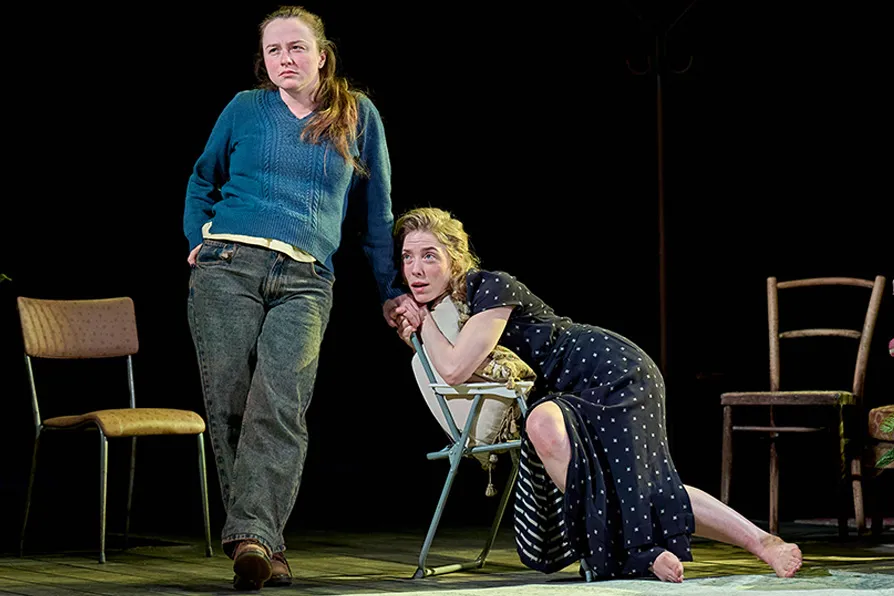New releases from Bill Callahan, The Delines, and Beck
MARY CONWAY applauds the study of a dysfunctional family set in an Ireland that could be anywhere

 BRUTAL PERSONIFICATION: Rosie Sheehy (Billie) and Hannah Morrish (Lydia) in The Brightening Air / Pic: Manuel Harlan
BRUTAL PERSONIFICATION: Rosie Sheehy (Billie) and Hannah Morrish (Lydia) in The Brightening Air / Pic: Manuel Harlan
The Brightening Air
Old Vic, London
★★★★★
THIS brand-new drama by Conor McPherson is long-awaited. His last original play, set in Minnesota, was the acclaimed Girl from the North Country written as a favour to Bob Dylan. Now he returns to rural Ireland in the 1980s, where he plunders the land of his birth for the visceral detail of life as lived beyond the public eye. And it’s magnificent.
The title, The Brightening Air, is a direct quote from Yeats and captures the moment when our magical dreams hit the light of reality. The play treads a mystical path through its people’s concrete lives into their hopes and unconscious longings, and thence to a kind of purpose.
And language is only one of its tools, for The Brightening Air uncovers truths about human existence that defy the approximation of words and reveal our own innate inability ever truly to know ourselves or what we’re for.
The drama centres on one house and one wildly dysfunctional family. This is Ireland but could be anywhere.
Permanent residents since childhood are brother and sister Stephen and Billie with, as frequent visitor, their sister-in-law Lydia. The action opens with the arrival of Lydia’s husband Dermot, followed by priest Uncle Pierre and his housekeeper Elizabeth. Two other characters shape the story and it ends with a departure. But the plot is not the point here, nor the passage of time. Rather, it’s the moment-by-moment exploration of human complexity.
This is McPherson at his most incisive, not only writing a sensational script but directing with a clarity of purpose that makes every line a winner. There are times in the first act when the tension plateaus and we, as an audience, struggle to find a predictable theme or resolvable conflict.
There are times when the dialogue meanders and conversation itself seems to be simply a device for the avoidance of silence. But the result is triumphant with an array of wonderfully conceived characters, often hilarious, deeply moving, bound inextricably together through blood or circumstance, and all at the mercy of a general jeopardy whereby hopes are never realised and dreams always miss their target.
Rae Smith’s set suggests a rustic room with one drab window on the side. But, while this reality lurks as an idea, the action focuses on arbitrary illuminated spots within the space, just as the characters are spotlit for us against a backdrop of a gruelling struggle for survival.
The whole cast excels. Chris O’Dowd embraces the despicable, faithless Dermot in a defining performance, jerking around the stage in weirdly overenergised bursts like a man demented. Brian Gleeson unearths for us the deep, desolate centre of the dour Stephen, and Hannah Morrish as Lydia – inexplicably abandoned – embodies the loveliest of women. Sean McGinley asserts the crazed sermonising of the confused and doubting priest, and Rosie Sheehy as Billie — at one with the home she has never left and dressed in terrible, self-loathing, ill-fitting clothes — brutally personifies the bleakness of obscurity.
Profound, eloquent and joyous in its enthralling observation of humankind, this is the work of a superb dramatist.
Runs until June 14. Box office: 0344 871-7628, www.oldvictheatre.com.

In his second round-up, EWAN CAMERON picks excellent solo shows that deal with Scottishness, Englishness and race as highlights

Borrowed Time: Lennon’s Last Decade, Parthenope, Where Dragons Live and Thunderbolts* reviewed by MICHAL BONCZA and MARIA DUARTE

Badenoch under pressure to sack shadow justice secretary









